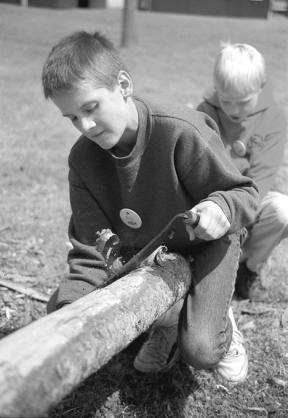Don’t tell their parents, but kids were doing chores this week and loving it.
It was all a part of the Living History – Pioneer Days for South Whidbey Intermediate School students at the Island County Fairgrounds Wednesday and Thursday.
The students stepped back in time as the fairgrounds seemed to warp back to a time when Whidbey Island had almost no roads, no ferry and a breed of people who had only themselves to rely upon. In several fair buildings and out on the midway, third-, fourth- and fifth-grade students churned butter, made candles, tied knots, scraped bark off trees and danced the dances their great-great-great grandparents would have if they lived in what was a much wilder Western Washington.
While these students dressed in modern clothes went from exhibit to exhibit, a few of the volunteer “pioneers” at the event donned bonnets, long skirts and aprons to make the time travel experience more realistic.
On the open lawns at the fairgrounds, some of the school children learned how to use a two-man saw among other pioneer lumber tools.
As he sat straddling a log and working hard to remove the bark, fifth-grader Josh Parsons couldn’t have been any happier during his trip to the event Wednesday afternoon.
“I like that the pioneer children got to do this stuff,” he said. “It’s funner than chores that we have to do today. I wish we could just live like pioneers for a week.”
The Living History — Pioneer Days project is overseen by South Whidbey Historical Society members such as Winnie McCleod, who helped keep the young students’ minds on learning history. South Whidbey Intermediate teachers also played a big part in the event, gathering the volunteer demonstrators.
Demonstrators included South Whidbey AmeriCorps team members, South Whidbey blacksmiths, historical society members, teachers and parents.
This is the fourth time the Living History event has taken place. It’s on a three-year rotation to match the students’ curriculum, according to fourth-grade teacher Marge Carter.
The school times the event so the students have had their pioneer history lessons the students step onto the fairgrounds and step back in time. As a part of their curriculum, they study the history of the Oregon Trail, the Lewis and Clark Expedition, pioneer trailblazers, Indian tribes of the Pacific Northwest, early Seattle settlers, and some of the first people to set their sights on Whidbey Island.
Teacher Carter said this makes for a good deal of study material.
“There’s a deep, deep history here on Whidbey with the Indians who fished our shores and people like Captain Vancouver,” Carter said.
After studying in the classroom, the students get hands-on pioneer experience at Pioneer Days. Fourth-grader Nicole Patterson was fascinated Wednesday with what it took just to put food on the table and how much work children had to contribute to the daily life of a family.
“We churned butter, which is fun but strange because we don’t normally do it anymore,” she said.
Also adding to the food discussion were South Whidbey Tilth member, who talked to the students about crops the pioneers might have grown. The young green thumbs planted Bull’s Blood beets in small paper milk cartons, which they later took home. The beets are a part of the Tilth’s heirloom seed project and are now grown commercially in the Greenbank area, according to Tilth member Michael Seraphinoff.
Even the hardware needed to do the gardening had a source in the days of the pioneers, and as the students found out, that source was not Wal-Mart. Outside one of the fair’s old barns, fiery embers flew as blacksmiths Jeff Holtby, Chris Jones and Wayne Lewis worked quickly during 25-minute sessions to demonstrate their craft.
“Blacksmiths were highly important during pioneer days because they made the tools for almost all of the other trades,” Holtby said.
Seeing the old ways in practice made believers of the students, who until this week had only experienced history through books.
“It’s cool to learn what they used to do because we can pass it on to younger people and the history can go on and on,” said fourth-grader Courtney Johannsen, who marveled after listening to a description of hand-milking cows.
“To think they did a whole day’s worth of work for butter, and if a cow knocked it over there went their milk for the day,” she said. “People take a lot of things for granted today that the pioneers would be amazed by.”
Not far away from that talk, in the fine arts building at the fairgrounds, Whidbey Contra Dance Society member Will Collins was busy rangling up a group of third-graders. The scene was repeated throughout the day as he taught classes the “age-old fun of country dancing.”
Intermediate school music teacher Kimmer Morris was on fiddle in the corner of the building’s dance studio while Collins led teacher Marguerite Hauberg’s class in a serpent dance.
Amidst the giggling, parents who attended the event agreed the Living History-Pioneer Days project was truly a learning event.
“This project is terrific,” said Clinton resident Barbara Taylor, mother of fourth-grader Kelsey. “We’re relatively new to the island so everything is great to us, because these are skills they just wouldn’t get to do in a big city.”
“It connects them with the past,” said mother Barb Bennett.
The fun of the day was upset by just one nagging suspicion. Fourth-grader Garrett Smithberg was wary of the classwork that would follow his day’s outing.
“Something tells me there’s going to be a big writing assignment after this,” he said.



